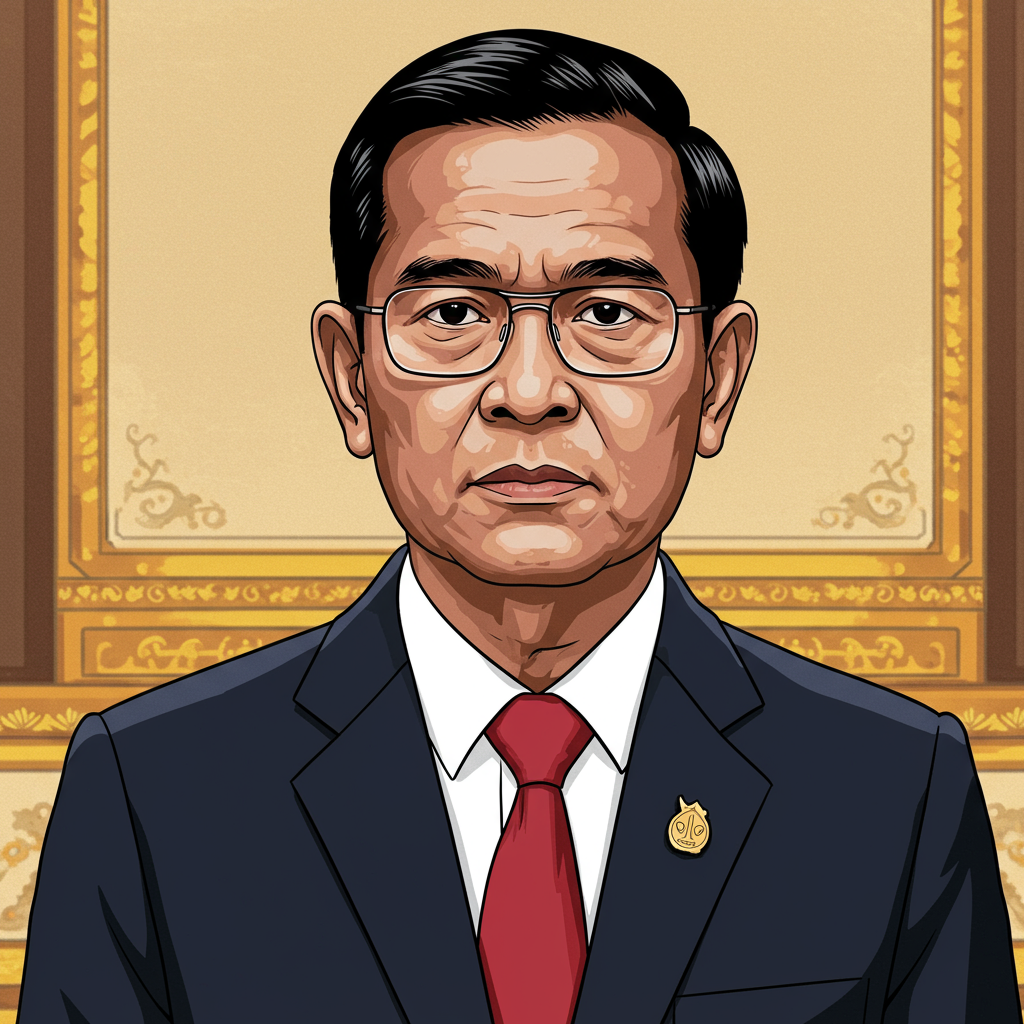Thailand’s political landscape has been rocked by a significant development: prime Minister paetongtarn Shinawatra has been suspended from her duties. The dramatic decision, handed down by the Constitutional Court, plunges the Southeast Asian nation into fresh uncertainty. This crisis unfolds amidst heightened tensions over a border dispute with neighboring Cambodia and raises serious questions about political ethics and stability.
Prime Minister Suspended Over Ethics Complaint
The Constitutional Court’s ruling came on Tuesday, following a petition filed by 36 senators. They accused Paetongtarn Shinawatra, leader of the Pheu Thai Party, of violating ethical standards. The core of the complaint centers on a controversial telephone conversation she had with Cambodian leader Hun Sen. The court agreed to consider the case and, in a significant move, voted 7-2 for her immediate suspension pending a final verdict.
Paetongtarn, 38, is the latest figure from the powerful Shinawatra family dynasty to face legal challenges and political upheaval. Her suspension occurs less than a year after she took office, succeeding an ally who was also removed by the same court.
The Controversial Phone Call Details
The alleged ethical lapse stems from a private conversation between Paetongtarn and Hun Sen that took place on June 15. This call occurred during a period of escalating tension between Thailand and Cambodia, including a border clash on May 28 that resulted in a Cambodian soldier’s death. Local media later made an audio clip of the conversation public on June 18.
According to reports and the senatorial complaint, the leaked recording captured Paetongtarn referring to Hun Sen as “uncle” and appearing notably deferential. More controversially, she allegedly criticized Thailand’s own military, specifically the commander of the 2nd Army Region who oversees the Cambodian border, describing him as an “adversary.” She also reportedly urged Hun Sen to disregard “the opposite side,” understood as a reference to the Thai military, and offered to “arrange” things he desired.
This perceived tone and content ignited an immediate uproar across Thailand. Critics, particularly from conservative and nationalist factions, viewed her remarks as undermining national sovereignty and jeopardizing security interests during a delicate diplomatic situation. The conversation drew condemnation even from lawmakers within her own coalition, leading to widespread calls for her resignation.
Political Fallout and Coalition Turmoil
The fallout from the leaked conversation was swift and severe. Public protests erupted in Bangkok, fueled by perceptions of mishandling the border issue and overstepping diplomatic norms. Thousands of conservative, pro-military demonstrators took to the streets, demanding her immediate removal.
Adding to the political instability, the second-largest member of her governing coalition, the Bhumjaithai Party, withdrew its support earlier in June citing the scandal. This defection necessitated a cabinet reshuffle, which was endorsed by King Maha Vajiralongkorn just hours before the court’s ruling. Bhumjaithai leader and former Deputy Prime Minister Anutin Charvirakul was removed from his governmental roles as a result. While intended to stabilize the government, the reshuffle highlighted the fragility of Paetongtarn’s support base even before her suspension.
Legal Challenges Mount Against Shinawatras
The Constitutional Court’s decision to suspend Paetongtarn is the latest in a series of legal and political battles involving the Shinawatra family. Thailand has endured decades of cyclical political crises, often pitting elected governments aligned with the Shinawatras against the traditional royalist-military establishment.
Paetongtarn’s father, former Prime Minister Thaksin Shinawatra, 75, was overthrown by the military in 2006 and has faced numerous legal charges since. In the 2023 election, voters strongly rejected military-backed rule, favoring the progressive Move Forward Party. However, Move Forward was blocked from forming a government and later disbanded. Thaksin’s Pheu Thai Party then formed a coalition government. The first Prime Minister under this administration, Srettha Thavisin, was removed by the Constitutional Court less than a year into his term over a separate ethics complaint, paving the way for Paetongtarn.
Paetongtarn herself has often been perceived as a proxy or “puppet” for her politically influential father, though she denies this. Her current suspension underscores the ongoing power struggle and the significant role the Constitutional Court plays in mediating (or sometimes instigating) political transitions in Thailand.
Beyond the Constitutional Court case, the Office of the National Anti-Corruption Commission (NACC) has also initiated its own inquiry into Paetongtarn’s conduct regarding the phone call. A finding by the NACC that she breached ethical standards could potentially lead to her permanent removal from office, independent of the court’s decision on the initial petition.
Paetongtarn’s Response and Path Forward
Following the court’s decision, Paetongtarn stated she accepted the ruling and would prepare her defense. Speaking to reporters, she asserted that her conversation with Hun Sen was conducted “in the national interest” and not for personal gain. She expressed regret if the call “might have offended some people” but maintained her intention was “100% my effort to protect the national interest.”
The court has granted her 15 days to formally present her case. During her suspension, Deputy Prime Minister Suriya Jungrungreangkit has been appointed to serve as the acting prime minister. While suspended from the top job, reports indicate Paetongtarn was also slated to take on the role of Culture Minister in the cabinet reshuffle endorsed earlier that day, though her ability to serve in this capacity while suspended as PM remains unclear.
Political analysts suggest Paetongtarn faces limited options. Potential paths include resignation, dissolving Parliament to trigger new elections, or navigating the complex court process with the hope of reinstatement. The possibility of military intervention, a recurring feature of Thai history, is seen as less likely given the Constitutional Court’s active involvement in the current crisis.
There is precedent in Thailand for suspended prime ministers to return to office. In 2022, former Prime Minister Prayuth Chan-ocha was suspended by the same court over a term limit dispute but was later reinstated after about five weeks. However, even if Paetongtarn is ultimately cleared, her political standing has been significantly damaged. A recent poll showed her approval rating plummeting from 30.9 percent to a mere 9.2 percent in just a few months.
The ongoing legal battle and her suspension represent a critical challenge to Paetongtarn Shinawatra’s leadership and cast a long shadow over Thailand’s already volatile political future.
Frequently Asked Questions
Why was Thailand’s Prime Minister Paetongtarn Shinawatra suspended?
Prime Minister Paetongtarn Shinawatra was suspended by the Constitutional Court based on an ethics complaint filed by senators. The complaint alleges she violated ethical standards during a leaked phone call with Cambodian leader Hun Sen concerning a border dispute. Critics argue her alleged comments in the call, including apparent deference to Hun Sen and criticism of the Thai military, were inappropriate and harmful to national interests.
What was the controversial phone call with Cambodian leader Hun Sen about?
The leaked phone call between Paetongtarn and Hun Sen discussed tensions related to a border dispute between Thailand and Cambodia. The call occurred after a deadly clash on the border. In the recording, Paetongtarn reportedly referred to Hun Sen as “uncle,” criticized a Thai military commander, and offered to “arrange” things for Hun Sen, which opponents claim showed undue deference and undermined Thailand’s position.
Who is serving as Thailand’s acting prime minister during the suspension?
During Paetongtarn Shinawatra’s suspension, Deputy Prime Minister Suriya Jungrungreangkit has been appointed to serve as the acting prime minister. This interim arrangement will remain in place until the Constitutional Court delivers its final ruling on the ethics case against Paetongtarn, determining whether she is permanently removed or reinstated.
The suspension of Prime Minister Paetongtarn Shinawatra underscores the deep-seated political divisions and institutional power struggles that continue to shape Thailand. Her fate now rests with the Constitutional Court, while the country braces for further potential instability amidst this latest chapter in its turbulent political history. The outcome will have significant implications not only for her career but for the direction of Thailand’s government and its international relations.




